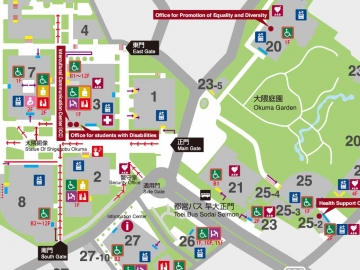30th Anniversary of the Ratification of the Convention on the Elimination of All Forms of Discrimination against Women:
Japan’s Promise to the International Community
| Date: | Thursday, May 28 2015 |
|---|---|
| Place: | Ono Memorial Hall |
| Lecturer: | Yoko Hayashi Attorney-at-Law and Chairperson of the Committee on the Elimination of Discrimination against Women (CEDAW) |
| Host: | Waseda Law School |
| Co-host: | Office for Promotion of Gender Equality |
| Lecturer: |  Yoko Hayashi Yoko HayashiProfile: Graduate of School of Law, Waseda University. Lawyer since 1983. First Japanese woman to be appointed Chairperson of the UN Committee on the Elimination of Discrimination against Women. |
This year marks 30 years since the United Nations Convention on the Elimination of All Forms of Discrimination against Women was ratified by Japan in 1985, and 20 years since the Beijing Declaration and Platform for Action. Ms. Hayashi Yoko, a lawyer who has played a prominent role in the women’s rights movement in Japan, spoke to an enthusiastic audience of 230 students, professors, and members of the public.
Ms. Hayashi emphasized the importance of both women and men fighting to end gender-based discrimination. “Those who fought on the front lines against discrimination toward women in many sectors of Japanese society were female lawyers,” she said. “However, when it comes to gender issues, the actions of men are also very important.”
An audience member’s perspective
 In an effort to address the current gender imbalance in Japan’s legal profession, Waseda Law School created the Female Lawyers Project. This lecture was part of that project. The fact that this school has produced many great alumnae in the legal profession, including Watanabe Michiko, not only makes me proud of our predecessors but also renews my determination to become a lawyer and carry on their work.
In an effort to address the current gender imbalance in Japan’s legal profession, Waseda Law School created the Female Lawyers Project. This lecture was part of that project. The fact that this school has produced many great alumnae in the legal profession, including Watanabe Michiko, not only makes me proud of our predecessors but also renews my determination to become a lawyer and carry on their work.
Japan’s efforts to eradicate discrimination against women unfortunately lag behind those of other developed countries. One of the key actions needed is to revise discriminatory laws in the Civil Code. Specifically, Japan should implement selective spousal surnames, equalize the legal age of marriage for both sexes, and abolish discrimination against children born out of wedlock. These cases are related to constitutional law, which I believe needs revision as soon as possible. Another essential step is to expand women’s participation in the decision-making process in various fields, including academia.
According to the World Economic Forum’s Global Gender Gap Index, Japan ranks 104th among 142 countries in terms of closing the equality gap between women and men. Internationally, we are very much behind in addressing this aspect of human rights. I have observed that the ratio of women decreases as my education advances. I feel as though the still-pervasive belief in Japan that women should marry early, have children, and become homemakers continues to work against women’s educational and professional achievements.
Thanks to many of our great predecessors, such as Ichikawa Fusae, I have the right to vote or to advance to graduate school and aim to become a lawyer. However, as Ms. Hayashi pointed out, Japan is still an undeveloped country when it comes to eliminating discrimination against women. There are many issues to be tackled. I plan to stay keenly aware of these issues and take up the challenge of abolishing discrimination for the next generation of women.
Shiori Saitoh
Third-year student
Waseda Law School
(by SANKAKU NEWS No.14)







